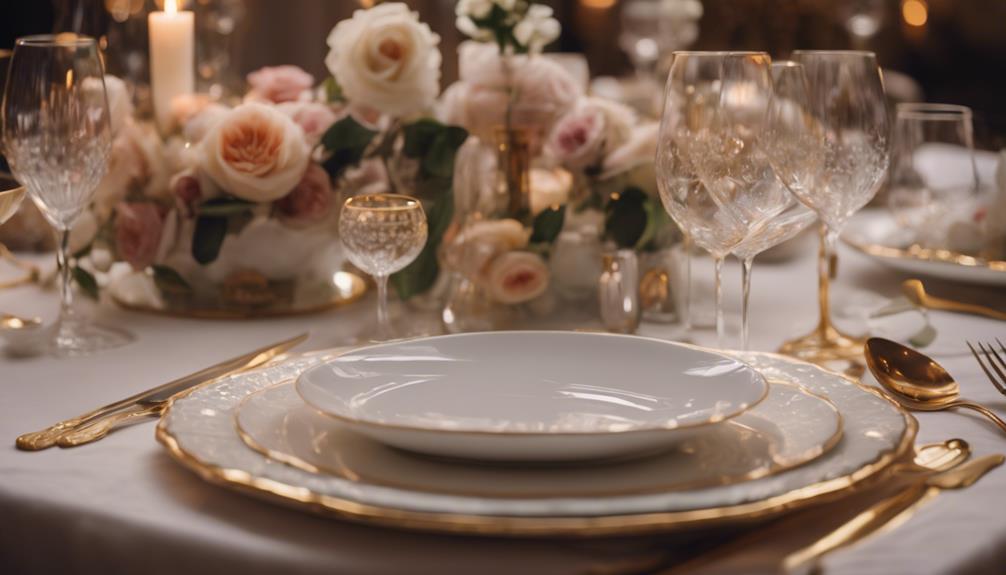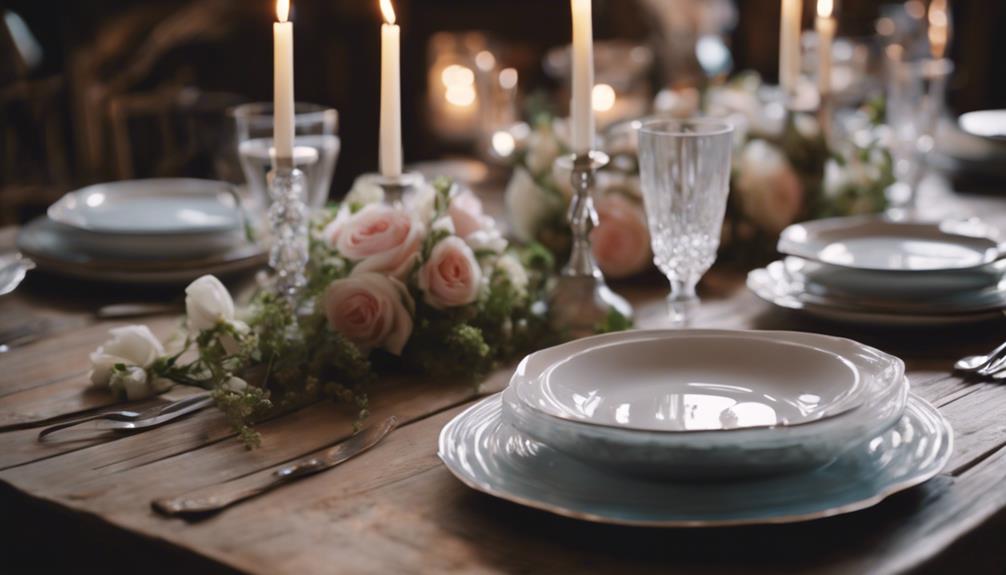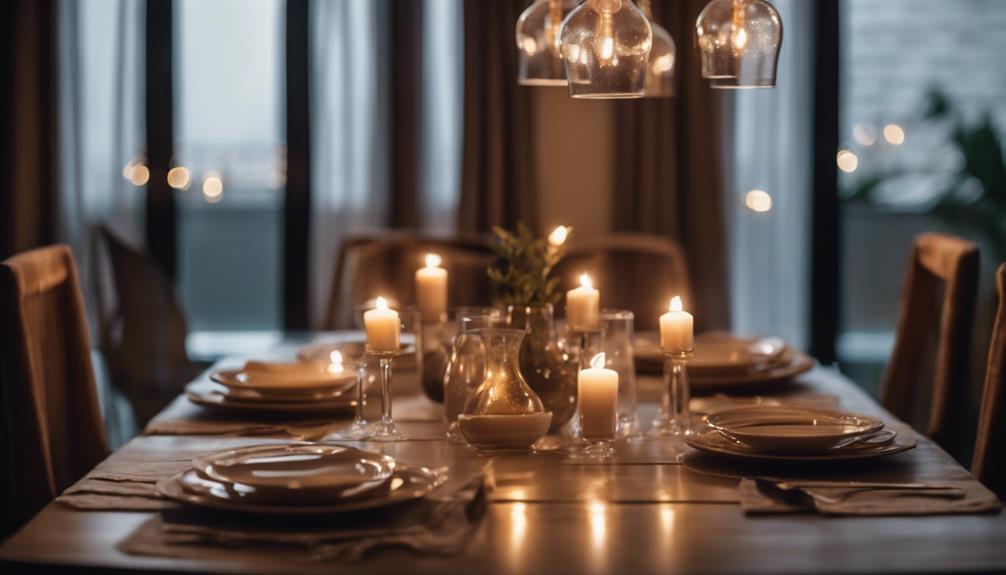Aesthetic dinnerware and serveware are essential for transforming any meal into an impressive and fascinating experience. Opt for cohesive color schemes when setting your table to create a visually stunning arrangement. Consider using materials such as porcelain for elegance or stoneware for a more rustic charm. Enhance your dining ambiance by adding stylish glassware and chic centerpieces. Lighting is key as well- consider warm pendant lights or charming string lights to beautifully enhance the atmosphere. And don’t forget to add decorative elements like textured table runners and ceramic vases to add unique touches. There are endless possibilities to explore in order to create the perfect dining experience!
Key Elements

When choosing aesthetic dinnerware, consider the color scheme, materials, and textures that resonate with your style.
These key elements play an essential role in creating a cohesive and inviting table setting.
Color Scheme
Choosing the right color scheme for your dinnerware can transform any meal into a visually stunning experience. Whether you opt for a ceramic dinnerware set in warm, light tones like petrol blue and black or a two-tone arrangement with glossy white and darker shades, you'll create a unique look that impresses your guests.
Consider stoneware dinnerware sets that feature seasonal and themed designs, adding a playful touch for special occasions. This approach not only brings joy to your dining but also showcases your creativity.
If you're aiming for elegance, look for pieces adorned with embossed floral details or gold rim accents. These elements elevate the overall table setting, making it suitable for more formal gatherings.
A cohesive color scheme can unify your dining experience. Matching serving trays and platters with your dinnerware enhances the aesthetic, leaving a lasting impression on your guests.
When you thoughtfully curate your color choices, you not only beautify your table but also create an atmosphere that invites conversation and enjoyment. Remember, the right colors can elevate your dining experience and make every meal memorable.
Materials
The materials you select for your dinnerware play an essential role in both the aesthetic and functional aspects of your dining experience.
Stoneware is a fantastic choice if you're drawn to rustic charm and resilience. Its durability guarantees it withstands daily use while adding a warm, inviting look to your table.
On the other hand, porcelain is celebrated for its elegance and fine quality, making it perfect for special occasions. If you prefer something lightweight with intricate designs, consider bone china, which often features beautiful gold trim.
For those focused on sustainability, eco-friendly options like the Grow Forward porcelain sets are crafted from earth-derived components, promoting a sustainable lifestyle.
Additionally, melamine dinnerware offers a lightweight, BPA-free alternative that's great for outdoor gatherings. While it's dishwasher safe, keep in mind that it isn't suitable for the microwave.
Ultimately, the materials you choose not only influence the visual appeal of your table setting but also determine the durability and practicality of your dinnerware. By selecting the right materials, you can enhance your dining experience and impress your guests.
Textures
Textures in dinnerware considerably enhance both the visual appeal and tactile experience, inviting you to engage more deeply with each piece on your table. From smooth ceramic finishes to the rustic charm of stoneware, the variety of textures available can transform your dining atmosphere. High-fired, glazed stoneware not only offers a luxurious feel but also guarantees durability with its scratch-resistant surface, allowing you to enjoy its texture for years.
Embossed details, like floral patterns or baroque designs, add intricate textures that elevate the aesthetic of your dinnerware, making each piece a conversation starter. You'll find that these embossed elements can turn an ordinary meal into a memorable event. Additionally, reactive glaze finishes on stoneware create dynamic textures that vary with every piece, giving your table a handcrafted appearance that suits both casual and formal settings.
Textured serving trays and platters further enhance the presentation of your dishes, transforming them into integral parts of the overall dining experience. By selecting dinnerware with diverse textures, you can elevate your meals, impressing your guests while enjoying the tactile pleasures of each beautifully crafted piece.
Essential Fixtures and Furniture

When setting up your dining area, an elegant wooden dining table serves as a perfect foundation for your aesthetic dinnerware.
Pair it with a stylish glassware set that complements your theme, and don't forget a chic centerpiece flower arrangement to tie everything together.
These essentials not only enhance the visual appeal but also create an inviting atmosphere for your guests.
Elegant Wooden Dining Table
An elegant wooden dining table instantly transforms your dining area into a warm and inviting space, perfect for both casual meals and formal gatherings. Its natural beauty and warmth elevate the aesthetic, making it a versatile centerpiece that complements any dinnerware collection. Whether you prefer a farmhouse, modern, or traditional style, there's a wooden dining table to fit your design preferences.
Crafted from solid wood materials like oak, walnut, or cherry, these tables are durable enough for daily use while adding character through unique grain patterns. You can easily enhance your place settings with a beautiful stoneware set, creating an inviting atmosphere for your guests. Many wooden tables also come with extension leaves, allowing flexibility for larger gatherings—ideal for family dinners or holiday celebrations.
To keep your elegant wooden dining table looking its best, regular maintenance is key. Polishing and avoiding excessive moisture will help preserve its finish, ensuring this stunning fixture remains a cherished part of your dining space for years to come. With the right table, your dining experience will be elevated, impressing everyone who gathers around it.
Stylish Glassware Set
A stylish glassware set can instantly elevate your dining experience, adding a touch of sophistication to any meal. Whether you're hosting a formal dinner or a casual get-together, the right glassware sets the tone for your gathering. Available in various stylish designs, these collections often feature unique decorative elements, like etched patterns or colored glass, which can enhance your table setting and impress your guests.
Not only do these glassware sets look beautiful, but many are also made from lead-free materials, ensuring safety while maintaining elegance. You'll find options that are dishwasher safe, making cleanup a breeze after those memorable dinners. This practicality allows you to enjoy your glassware for both everyday use and special occasions without compromising on style.
Investing in a stylish glassware set is a smart choice to elevate gatherings, as the beauty and functionality of the pieces complement your dinnerware perfectly. By choosing the right glassware, you create an inviting atmosphere, making each meal feel like a special occasion.
Chic Centerpiece Flower Arrangement
Transform your dining table with a chic centerpiece flower arrangement that captures attention and enhances your overall aesthetic. A well-designed floral arrangement not only serves as a stunning focal point but also complements your dinnerware and serveware beautifully.
To elevate your dining experience, consider using seasonal flowers that reflect the time of year, adding freshness and vibrancy to your table setting. When crafting your chic centerpiece, incorporate varying heights and textures to create depth and interest, making it more dynamic and engaging for your guests.
Choosing a color palette that harmonizes with your dinnerware is essential. For instance, if you have a stoneware set, match it with similarly colored blooms for a cohesive look that speaks style.
Don't forget the importance of sustainability; opt for eco-friendly vases and locally sourced flowers. This not only enhances your table's appearance but also promotes eco-conscious practices, allowing you to impress your guests with both beauty and responsibility.
With these tips, you're all set to create a chic centerpiece that transforms your dining experience into something truly memorable.
Lighting Ideas

When setting the stage for your dining experience, lighting plays an essential role in enhancing the beauty of your dinnerware.
You can use warm pendant lights above the table, sleek wall sconces for ambiance, or charming string lights overhead to create a welcoming atmosphere.
Accent lanterns on the tabletop can also add a touch of elegance, making your table setting truly shine.
Warm Pendant Lights Above Table
Warm pendant lights above your dining table set the perfect mood, creating an inviting atmosphere that enhances your dining experience.
Choosing the right pendant lights is essential for achieving a stylish and functional space. Opt for lights with a color temperature between 2700K to 3000K, as this range provides a soft, cozy glow that beautifully complements your dinnerware and serveware.
You'll want to contemplate pendant lights with adjustable height options, allowing you to customize the illumination to suit your table setting. This feature guarantees focused lighting while also serving as a design statement in your dining area.
Additionally, selecting pendant lights with dimmable features gives you the flexibility to adjust brightness levels, making it easy to shift from casual meals to elegant dinner parties.
To create a cohesive design, choose pendant lights made from materials like glass, metal, or wood that harmonize with your dinnerware's aesthetic. This thoughtful combination not only elevates the overall look of your dining space but also impresses your guests, making every meal feel special and inviting.
Sleek Wall Sconces for Ambiance
Sleek wall sconces add a touch of modern elegance to your dining space while providing essential lighting for an inviting atmosphere. These decorative lighting fixtures not only serve a functional purpose but also enhance the ambiance, making your dining experience more enjoyable.
With various materials like metal, glass, and ceramic, you can find sconces that beautifully complement your dinnerware, whether you prefer a rustic charm or a contemporary vibe. Energy-efficient designs utilizing LED bulbs guarantee that you'll enjoy long-lasting illumination without a hefty electricity bill.
Adjustable sconces offer the flexibility to customize lighting levels, allowing you to set the perfect mood for casual meals or formal gatherings. You can strategically place these sconces to highlight specific areas of your dining room, drawing attention to beautiful dinnerware displays and creating a cohesive aesthetic.
Incorporating sleek wall sconces into your dining decor not only elevates the space but also impresses your guests. By enhancing the ambiance with stylish lighting, you'll create a memorable dining experience that leaves everyone feeling welcomed and appreciated.
Choose the right sconces, and watch your dining area transform into a sophisticated haven.
Charming String Lights Overhead
Charming string lights add a delightful glow overhead, instantly transforming your dining space into a cozy and inviting retreat. They create a warm ambiance that enhances the aesthetic of your dinnerware, making each meal feel special.
Whether you prefer a modern or rustic theme, string lights are available in various styles and colors, allowing you to complement your décor beautifully. Drape them overhead or along walls to establish a magical atmosphere that encourages relaxed conversations and enjoyable dining experiences.
LED string lights aren't only energy-efficient but also long-lasting, making them a sustainable choice for both indoor and outdoor settings. You can even find many options with adjustable brightness settings, letting you customize the lighting for casual dinners or festive gatherings.
Incorporating string lights into your dining area elevates the overall vibe, encouraging guests to linger longer and relish every moment. So, as you set the table with your favorite dinnerware, don't forget to add those enchanting string lights overhead. They'll create the perfect backdrop for your next gathering and leave a lasting impression on everyone.
Accent Lanterns for Tabletop
Accent lanterns add a unique touch to your tabletop decor, enhancing the ambiance while providing functional lighting for your gatherings. These decorative pieces come in various materials like glass, metal, and ceramic, allowing you to choose styles that perfectly complement your dinnerware and serveware.
Many accent lanterns feature intricate patterns or cutouts, casting beautiful shadows that enrich the overall atmosphere of your dining table setting. Whether you're hosting an intimate dinner or a festive occasion, these lanterns create a warm and inviting mood.
You can opt for battery-operated or solar-powered options, making them eco-friendly and perfect for outdoor dining experiences. Their versatility in size enables you to layer and arrange them creatively, forming an eye-catching centerpiece that draws guests' attention.
Incorporating accent lanterns into your decor not only elevates your dining experience but also serves as functional lighting that enhances conversations and moments shared around the table.
Decorative Elements

When setting your table, consider incorporating decorative elements like an artistic ceramic vase as a centerpiece to draw the eye.
A textured linen table runner can add depth and warmth, while an intricate woven basket can serve both functional and aesthetic purposes.
Together, these details enhance your dining experience and create a visually appealing atmosphere.
Artistic Ceramic Vase Centerpiece
An artistic ceramic vase centerpiece transforms your dining table into an enchanting focal point that enhances the overall aesthetic of your dining experience.
These vases come in various designs, colors, and finishes, allowing you to find the perfect piece that complements your style, whether modern or rustic. Crafted from high-quality materials, they not only look elegant but also promise durability and longevity.
Incorporating seasonal flowers or unique arrangements in your artistic ceramic vase adds a personalized touch, creating a warm and inviting atmosphere for your guests.
Imagine the delight on their faces as they admire your thoughtful decor. When paired with a cohesive dinnerware set, like a 24 Piece Dinnerware Set for 8, your vase truly elevates the dining experience, showcasing your attention to detail and design.
Textured Linen Table Runner
A textured linen table runner beautifully complements your artistic ceramic vase, adding elegance and sophistication to your dining setup. This durable piece is perfect for enhancing the overall aesthetic of your table, whether you're hosting a casual brunch or a formal dinner party. The natural fibers of linen not only look refined but also offer a sustainable choice that can withstand frequent use while maintaining its beauty.
Available in various colors and patterns, the textured linen table runner can effortlessly complement different dinnerware sets, from modern stoneware to classic porcelain. Its breathable nature helps create a relaxed and inviting atmosphere, ensuring your guests feel comfortable and welcomed. Plus, you'll appreciate that many linen table runners are machine washable, making maintenance a breeze.
With the right textured linen table runner, you can elevate your dining experience and impress everyone at your table. This elegant addition brings a touch of charm and sophistication to any meal, making it a must-have for your dining decor. So, why not choose a runner that speaks to your style and enhances your dining experience?
Intricate Woven Basket Centerpiece
Intricate woven basket centerpieces transform your dining table into a rustic haven, adding both charm and functionality to your meal presentation. Crafted from natural materials like rattan or seagrass, these centerpieces not only enhance the aesthetic but also align with eco-friendly themes, making them a sustainable choice for your dining experience.
The versatility of woven baskets is one of their greatest assets. You can use them to hold fresh fruits, bread, or even decorative items, ensuring that they serve multiple purposes while still looking beautiful. Their intricate designs come in various sizes and styles, allowing you to tailor them to fit any occasion, from casual family dinners to elegant gatherings.
Incorporating an intricate woven basket centerpiece into your dining decor creates a warm and inviting atmosphere. This encourages conversation and enjoyment among your guests, making every meal feel special.
Flooring

When you're choosing flooring for your dining space, consider options like reclaimed hardwood planks for a rustic charm,
polished concrete with warm tones for a modern touch,
or natural stone tile for durability and elegance.
Each choice can transform the atmosphere and enhance your aesthetic dinnerware and serveware.
Think about how these flooring styles align with your overall design vision.
Reclaimed Hardwood Floor Planks
Reclaimed hardwood floor planks bring a unique charm and sustainability to your space, showcasing the beauty of history with every board. Sourced from salvaged wood, often from old buildings and barns, these planks add a distinctive character that new materials simply can't match. Each board tells a story, featuring varying textures, colors, and historical markings that enhance the warmth of your home.
One of the biggest advantages of using reclaimed wood is its sustainability. By repurposing timber, you're reducing the demand for new hardwood, which helps combat deforestation. Plus, reclaimed hardwood floors are durable, often lasting for decades with minimal maintenance. The natural oils present in the wood make them even more resilient.
Another remarkable benefit is improved indoor air quality. Unlike new synthetic materials, reclaimed wood is typically free from harmful chemicals, creating a healthier living environment.
Installation can also be cost-effective, especially given the rising trend of upcycling. So, if you're looking to elevate your space with a flooring option that combines beauty, sustainability, and durability, reclaimed hardwood floor planks might just be the perfect choice for you.
Polished Concrete With Warm Tones
While reclaimed hardwood floor planks offer historical charm, polished concrete with warm tones brings a modern yet cozy feel to your space, enhancing its overall aesthetic.
This flooring option can be customized with various stains and finishes, allowing you to choose warm hues like sandy beige or soft browns. These tones create an inviting atmosphere that pairs beautifully with your dinner plates and Stoneware Dinnerware Set.
Polished concrete isn't only visually appealing but also highly durable, making it perfect for high-traffic areas. It withstands wear while offering a low-maintenance solution for busy homes or commercial spaces.
Plus, its reflective surface improves natural light distribution, brightening your dining experience.
Whether you're hosting a casual dinner with family or an elegant soirée, the warm-toned polished concrete floor complements your plates and bowls sets, enhancing the overall dining vibe.
It adds a touch of sophistication without breaking the bank, as well-made polished concrete options come at various price points. Choose this versatile flooring to elevate your space and impress everyone who steps into your home!
Natural Stone Tile Flooring
Natural stone tile flooring offers unmatched durability and aesthetic appeal, making it a perfect choice for both modern and traditional spaces. When you opt for natural stone, you're choosing a material that can withstand heavy foot traffic, ensuring your floors look stunning for years to come. Available in materials like granite, marble, slate, and limestone, you'll find a variety of unique textures and colors to suit any design style.
Not only does natural stone enhance the aesthetic appeal of your home, but it's also eco-friendly. Sourced directly from the earth, these tiles promote sustainable building practices when extracted responsibly. You can feel good about your choice, knowing you're using a material that's both beautiful and kind to the environment.
While some natural stones may require sealing to prevent staining, their maintenance is simple with regular cleaning. Each tile is unique, allowing you to create personalized flooring designs that stand out.
Whether you're preparing for an elegant dinner or a casual gathering, natural stone tile flooring elevates your dining options, ensuring your space is as impressive as the dishes you serve.
How Can Aesthetic Dinnerware and Serveware Enhance the Tropical Themed Dining Experience?
Elevate your tropical dining experience with the perfect aesthetic dinnerware and serveware. Bright, colorful plates and utensils can enhance the tropical ambiance, while themed serving platters and bowls can create a cohesive look. For more tropical bedroom paradise ideas, consider incorporating natural textures and vibrant patterns into your table setting.
Conclusion
By incorporating aesthetic dinnerware and serveware into your dining setup, you'll create an inviting atmosphere that impresses your guests.
Don't forget to pay attention to essential fixtures, lighting, and decorative elements that enhance the overall vibe.
With the right flooring, you'll tie everything together beautifully.
Elevate your dining experience and make every meal a delightful occasion.
So go ahead, set that table and enjoy the compliments that come your way!









